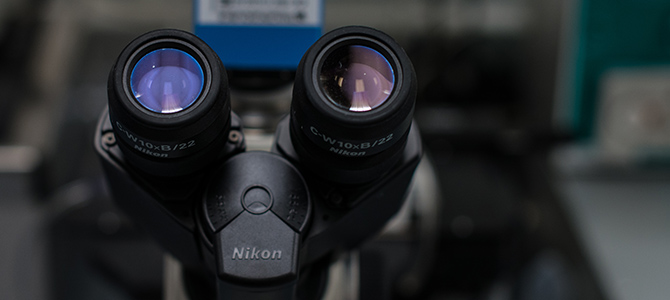
Cerebral Palsy Research Awarded $80K Grant

Six $80,000 grants have been awarded as part of the second round of funding to support collaborative research by the Research Development and Partnering Initiative developed by the University of Arizona College of Medicine – Phoenix.
The grants are meant to facilitate collaborations that enrich research, promote faculty development and help early career investigators establish partnerships.
The Initiative awarded $530,000 to 16 research projects across the Valley under two tiers of grants. Ten mentored projects for students each received $5,000, while six $80,000 grants were awarded to collaborative projects for UA faculty. In the first round, five $5,000 student grants and two $80,000 collaborative grants were awarded.
Second-round awardees include Michael Kruer, MD, an associate professor of Child Health at the College and director of Pediatric Movement Disorders at Barrow Neurological Institute, and Rita Sattler, PhD, an associate professor of Neurobiology at Barrow. The two received an $80,000 grant for their research in cerebral palsy, a neurodevelopmental disorder affecting as many as one in 250 children. The research allows Dr. Kruer’s genetics lab to work with Dr. Sattler’s lab, which grows cells from living patients. The two hope to develop a brain-in-a-dish model of cerebral palsy that will lead to better diagnostics and treatments.
“The seed grant will allow us to generate human-derived nerve cells, grow them in a dish and analyze effects of CP gene loss on them,” Dr. Kruer said. “This work will pave the way to develop the first human nerve cell models of the genetic forms of cerebral palsy.”
In addition to Drs. Kruer and Sattler, others who received an $80,000 grant include:
- Joel Barkley, MD, Maricopa Integrated Health System, and Frederic Zenhausern, PhD, MBA, director of the Center for Applied NanoBioscience and Medicine at the UA College of Medicine – Phoenix, for research on the identification of endometrial cancer.
- Amelia Gallitano, MD, PhD, UA College of Medicine – Phoenix, and Steve Chung, MD, Banner – University Medical Center Phoenix, for research on developing a test for schizophrenia.
- Ming Gao, PhD, Dignity Health/Barrow Neurological Institute, and Shenfeng Qiu, PhD, UA College of Medicine – Phoenix, for research on neuron excitability.
- Ella Nikulina, PhD, UA College of Medicine – Phoenix, and Jie Wu, MD, PhD, Barrow Neurological Institute, for research on the role of VTA glutamate receptors in drug addiction.
- Aparna Sertil, PhD, UA College of Medicine Phoenix, and David Azorsa, PhD, Phoenix Children’s Hospital, for research on treatment of pediatric osteosarcoma.
The Initiative has a total of $1.5 million to allocate. It awarded 11 research projects over the past year; an additional 12 research projects have been provisionally awarded.
Members of the Initiative include the University of Arizona College of Medicine – Phoenix, Banner – University Medical Center Phoenix, St. Joseph’s Hospital and Medical Center/Barrow Neurological Institute, Phoenix Children’s Hospital and Maricopa Integrated Health System.
“I am encouraged that the University of Arizona College of Medicine – Phoenix and its partners are working together to encourage student, resident and fellow research efforts, and to stimulate faculty interactions leading to research relationships, projects and programs,” said Burt Feuerstein, MD, PhD, professor of Neurology at the College and program officer of the Initiative.
“In the next few years, we want to see successful students, residents, fellows and faculty,” Dr. Feuerstein said. “We hope this funding will seed long-term projects and programs that eventually lead to better health outcomes and higher visibility of Phoenix-based research.”
A third round of requests for applications will be announced soon.
About the College
Founded in 2007, the University of Arizona College of Medicine – Phoenix inspires and trains exemplary physicians, scientists and leaders to advance its core missions in education, research, clinical care and service to communities across Arizona. The college’s strength lies in our collaborations and partnerships with clinical affiliates, community organizations and industry sponsors. With our primary affiliate, Banner Health, we are recognized as the premier academic medical center in Phoenix. As an anchor institution of the Phoenix Bioscience Core, the college is home to signature research programs in neurosciences, cardiopulmonary diseases, immunology, informatics and metabolism. These focus areas uniquely position us to drive biomedical research and bolster economic development in the region.
As an urban institution with strong roots in rural and tribal health, the college has graduated more than 1,000 physicians and matriculates 130 students each year. Greater than 60% of matriculating students are from Arizona and many continue training at our GME sponsored residency programs, ultimately pursuing local academic and community-based opportunities. While our traditional four-year program continues to thrive, we will launch our recently approved accelerated three-year medical student curriculum with exclusive focus on primary care. This program is designed to further enhance workforce retention needs across Arizona.
The college has embarked on our strategic plan for 2025 to 2030. Learn more.